EVRE5017 Evaluation & Reflection: Models Application and Experience
VerifiedAdded on 2023/06/09
|20
|6388
|332
Report
AI Summary
This report demonstrates the application of reflection models, specifically Kolb's and Boud's, to analyze personal learning experiences within the context of the EVRE5017 module. The first part focuses on a reflective analysis of the first week of the module using Kolb's Reflective Model, detailing concrete experiences, reflections, generalizations, and applications. The second part provides a summary reflection of the entire ten-week module, utilizing David Boud's Reflection Model to understand the application of gained knowledge for future tasks. The report also includes a personal analysis, setting SMART goals, and defining personal objectives to enhance personal and professional development. This student assignment is available on Desklib, where students can find a variety of solved assignments and past papers.
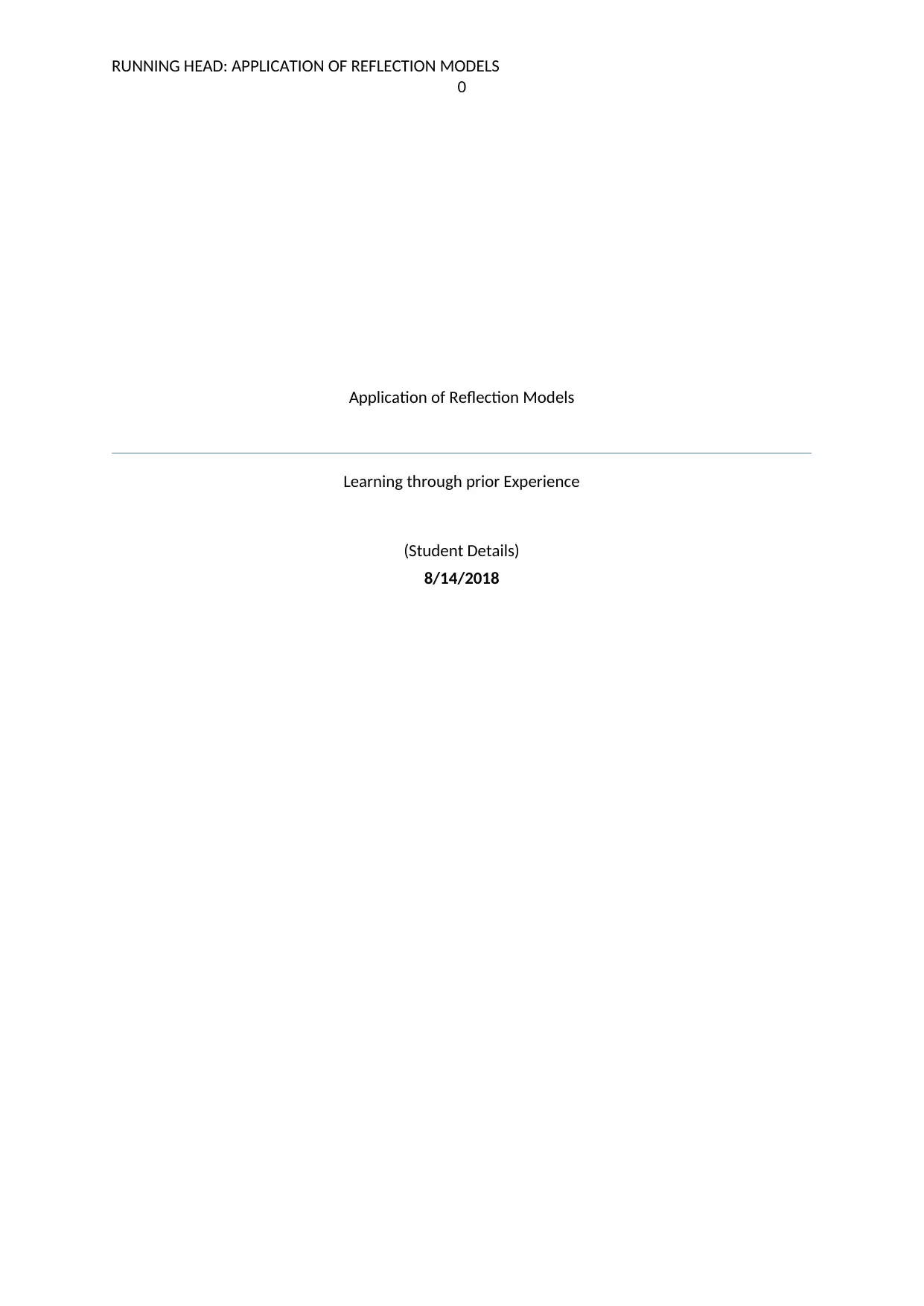
RUNNING HEAD: APPLICATION OF REFLECTION MODELS
0
Application of Reflection Models
Learning through prior Experience
(Student Details)
8/14/2018
0
Application of Reflection Models
Learning through prior Experience
(Student Details)
8/14/2018
Paraphrase This Document
Need a fresh take? Get an instant paraphrase of this document with our AI Paraphraser
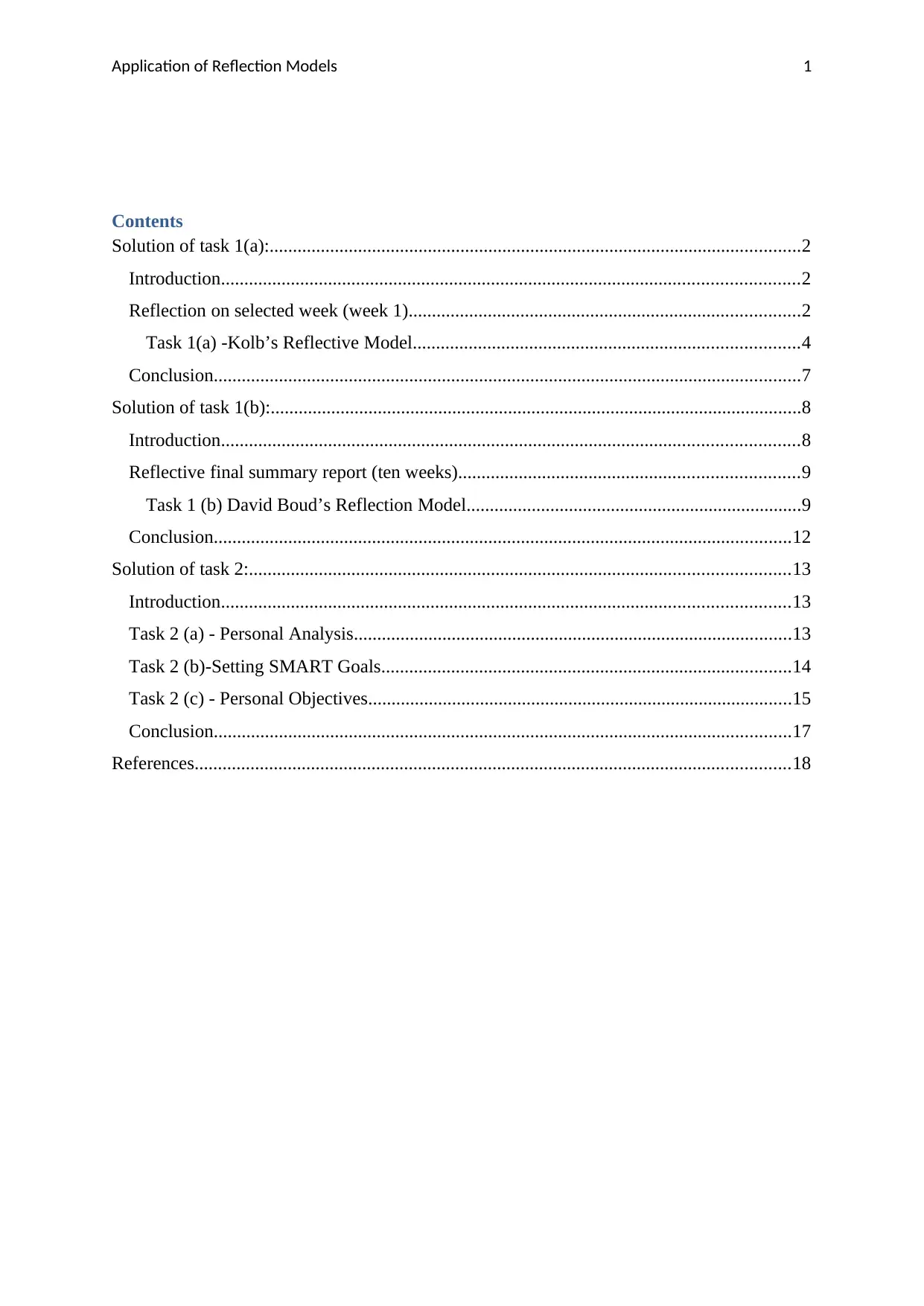
Application of Reflection Models 1
Contents
Solution of task 1(a):..................................................................................................................2
Introduction............................................................................................................................2
Reflection on selected week (week 1)....................................................................................2
Task 1(a) -Kolb’s Reflective Model...................................................................................4
Conclusion..............................................................................................................................7
Solution of task 1(b):..................................................................................................................8
Introduction............................................................................................................................8
Reflective final summary report (ten weeks).........................................................................9
Task 1 (b) David Boud’s Reflection Model........................................................................9
Conclusion............................................................................................................................12
Solution of task 2:....................................................................................................................13
Introduction..........................................................................................................................13
Task 2 (a) - Personal Analysis..............................................................................................13
Task 2 (b)-Setting SMART Goals........................................................................................14
Task 2 (c) - Personal Objectives...........................................................................................15
Conclusion............................................................................................................................17
References................................................................................................................................18
Contents
Solution of task 1(a):..................................................................................................................2
Introduction............................................................................................................................2
Reflection on selected week (week 1)....................................................................................2
Task 1(a) -Kolb’s Reflective Model...................................................................................4
Conclusion..............................................................................................................................7
Solution of task 1(b):..................................................................................................................8
Introduction............................................................................................................................8
Reflective final summary report (ten weeks).........................................................................9
Task 1 (b) David Boud’s Reflection Model........................................................................9
Conclusion............................................................................................................................12
Solution of task 2:....................................................................................................................13
Introduction..........................................................................................................................13
Task 2 (a) - Personal Analysis..............................................................................................13
Task 2 (b)-Setting SMART Goals........................................................................................14
Task 2 (c) - Personal Objectives...........................................................................................15
Conclusion............................................................................................................................17
References................................................................................................................................18
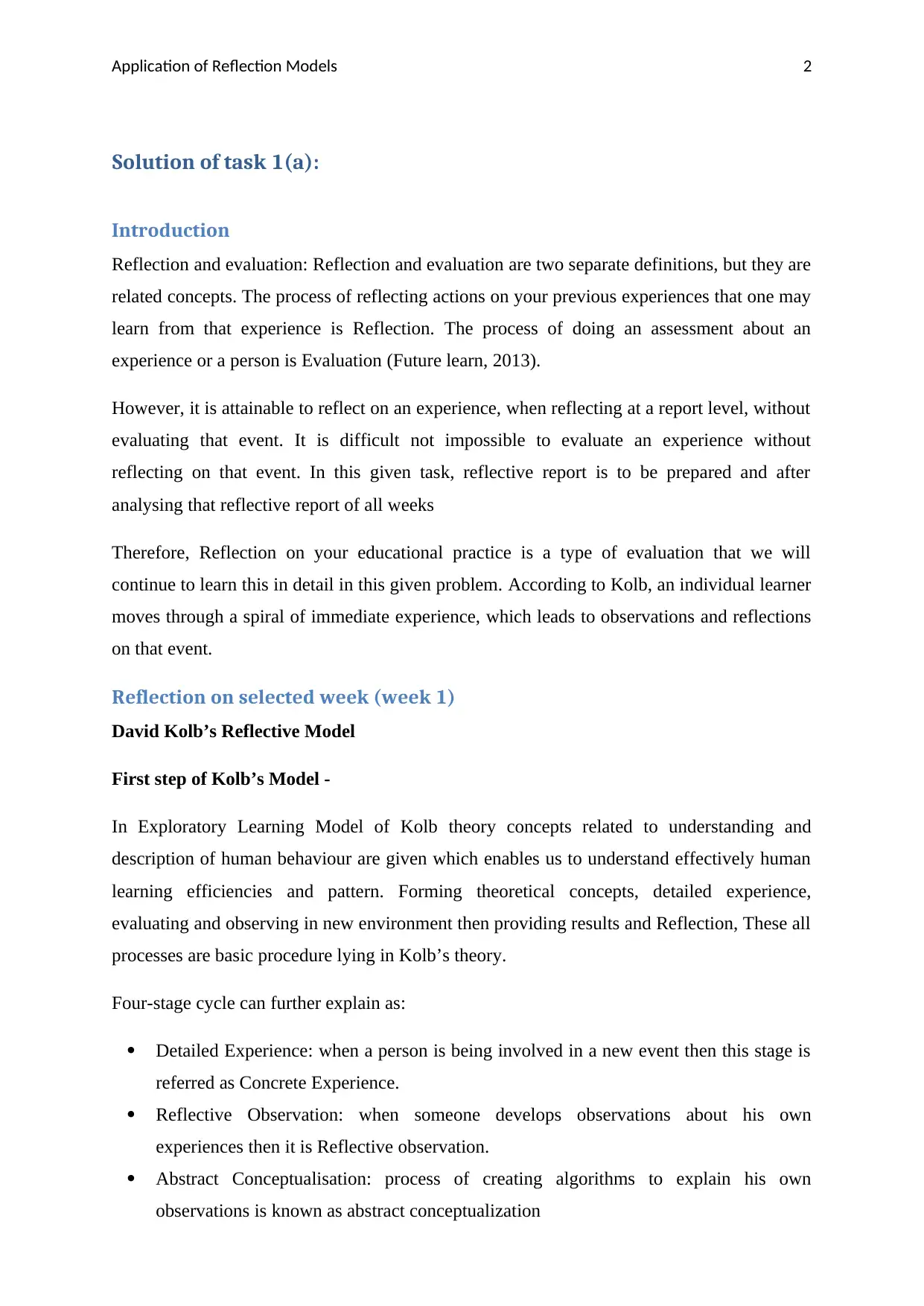
Application of Reflection Models 2
Solution of task 1(a):
Introduction
Reflection and evaluation: Reflection and evaluation are two separate definitions, but they are
related concepts. The process of reflecting actions on your previous experiences that one may
learn from that experience is Reflection. The process of doing an assessment about an
experience or a person is Evaluation (Future learn, 2013).
However, it is attainable to reflect on an experience, when reflecting at a report level, without
evaluating that event. It is difficult not impossible to evaluate an experience without
reflecting on that event. In this given task, reflective report is to be prepared and after
analysing that reflective report of all weeks
Therefore, Reflection on your educational practice is a type of evaluation that we will
continue to learn this in detail in this given problem. According to Kolb, an individual learner
moves through a spiral of immediate experience, which leads to observations and reflections
on that event.
Reflection on selected week (week 1)
David Kolb’s Reflective Model
First step of Kolb’s Model -
In Exploratory Learning Model of Kolb theory concepts related to understanding and
description of human behaviour are given which enables us to understand effectively human
learning efficiencies and pattern. Forming theoretical concepts, detailed experience,
evaluating and observing in new environment then providing results and Reflection, These all
processes are basic procedure lying in Kolb’s theory.
Four-stage cycle can further explain as:
Detailed Experience: when a person is being involved in a new event then this stage is
referred as Concrete Experience.
Reflective Observation: when someone develops observations about his own
experiences then it is Reflective observation.
Abstract Conceptualisation: process of creating algorithms to explain his own
observations is known as abstract conceptualization
Solution of task 1(a):
Introduction
Reflection and evaluation: Reflection and evaluation are two separate definitions, but they are
related concepts. The process of reflecting actions on your previous experiences that one may
learn from that experience is Reflection. The process of doing an assessment about an
experience or a person is Evaluation (Future learn, 2013).
However, it is attainable to reflect on an experience, when reflecting at a report level, without
evaluating that event. It is difficult not impossible to evaluate an experience without
reflecting on that event. In this given task, reflective report is to be prepared and after
analysing that reflective report of all weeks
Therefore, Reflection on your educational practice is a type of evaluation that we will
continue to learn this in detail in this given problem. According to Kolb, an individual learner
moves through a spiral of immediate experience, which leads to observations and reflections
on that event.
Reflection on selected week (week 1)
David Kolb’s Reflective Model
First step of Kolb’s Model -
In Exploratory Learning Model of Kolb theory concepts related to understanding and
description of human behaviour are given which enables us to understand effectively human
learning efficiencies and pattern. Forming theoretical concepts, detailed experience,
evaluating and observing in new environment then providing results and Reflection, These all
processes are basic procedure lying in Kolb’s theory.
Four-stage cycle can further explain as:
Detailed Experience: when a person is being involved in a new event then this stage is
referred as Concrete Experience.
Reflective Observation: when someone develops observations about his own
experiences then it is Reflective observation.
Abstract Conceptualisation: process of creating algorithms to explain his own
observations is known as abstract conceptualization
⊘ This is a preview!⊘
Do you want full access?
Subscribe today to unlock all pages.

Trusted by 1+ million students worldwide
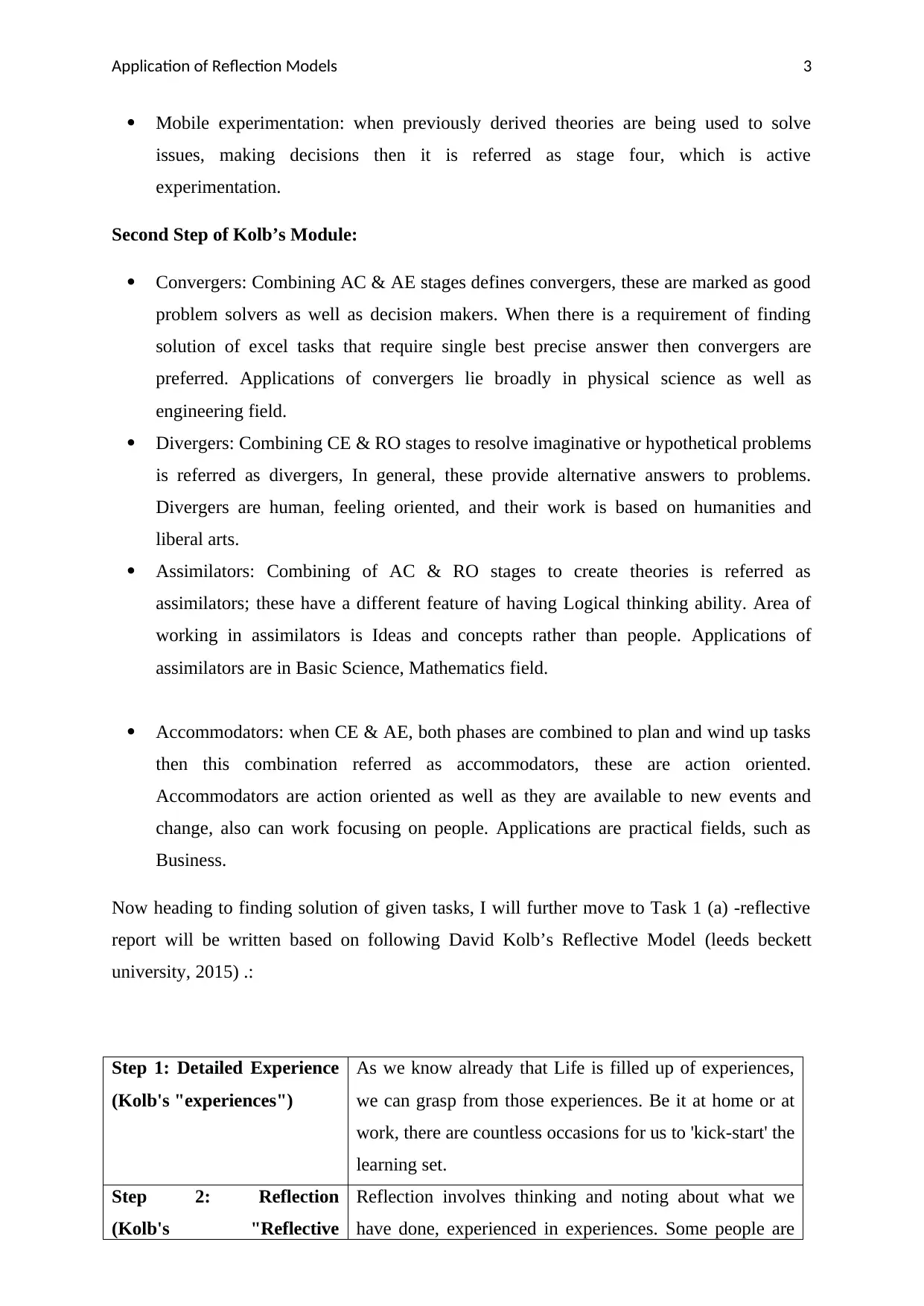
Application of Reflection Models 3
Mobile experimentation: when previously derived theories are being used to solve
issues, making decisions then it is referred as stage four, which is active
experimentation.
Second Step of Kolb’s Module:
Convergers: Combining AC & AE stages defines convergers, these are marked as good
problem solvers as well as decision makers. When there is a requirement of finding
solution of excel tasks that require single best precise answer then convergers are
preferred. Applications of convergers lie broadly in physical science as well as
engineering field.
Divergers: Combining CE & RO stages to resolve imaginative or hypothetical problems
is referred as divergers, In general, these provide alternative answers to problems.
Divergers are human, feeling oriented, and their work is based on humanities and
liberal arts.
Assimilators: Combining of AC & RO stages to create theories is referred as
assimilators; these have a different feature of having Logical thinking ability. Area of
working in assimilators is Ideas and concepts rather than people. Applications of
assimilators are in Basic Science, Mathematics field.
Accommodators: when CE & AE, both phases are combined to plan and wind up tasks
then this combination referred as accommodators, these are action oriented.
Accommodators are action oriented as well as they are available to new events and
change, also can work focusing on people. Applications are practical fields, such as
Business.
Now heading to finding solution of given tasks, I will further move to Task 1 (a) -reflective
report will be written based on following David Kolb’s Reflective Model (leeds beckett
university, 2015) .:
Step 1: Detailed Experience
(Kolb's "experiences")
As we know already that Life is filled up of experiences,
we can grasp from those experiences. Be it at home or at
work, there are countless occasions for us to 'kick-start' the
learning set.
Step 2: Reflection
(Kolb's "Reflective
Reflection involves thinking and noting about what we
have done, experienced in experiences. Some people are
Mobile experimentation: when previously derived theories are being used to solve
issues, making decisions then it is referred as stage four, which is active
experimentation.
Second Step of Kolb’s Module:
Convergers: Combining AC & AE stages defines convergers, these are marked as good
problem solvers as well as decision makers. When there is a requirement of finding
solution of excel tasks that require single best precise answer then convergers are
preferred. Applications of convergers lie broadly in physical science as well as
engineering field.
Divergers: Combining CE & RO stages to resolve imaginative or hypothetical problems
is referred as divergers, In general, these provide alternative answers to problems.
Divergers are human, feeling oriented, and their work is based on humanities and
liberal arts.
Assimilators: Combining of AC & RO stages to create theories is referred as
assimilators; these have a different feature of having Logical thinking ability. Area of
working in assimilators is Ideas and concepts rather than people. Applications of
assimilators are in Basic Science, Mathematics field.
Accommodators: when CE & AE, both phases are combined to plan and wind up tasks
then this combination referred as accommodators, these are action oriented.
Accommodators are action oriented as well as they are available to new events and
change, also can work focusing on people. Applications are practical fields, such as
Business.
Now heading to finding solution of given tasks, I will further move to Task 1 (a) -reflective
report will be written based on following David Kolb’s Reflective Model (leeds beckett
university, 2015) .:
Step 1: Detailed Experience
(Kolb's "experiences")
As we know already that Life is filled up of experiences,
we can grasp from those experiences. Be it at home or at
work, there are countless occasions for us to 'kick-start' the
learning set.
Step 2: Reflection
(Kolb's "Reflective
Reflection involves thinking and noting about what we
have done, experienced in experiences. Some people are
Paraphrase This Document
Need a fresh take? Get an instant paraphrase of this document with our AI Paraphraser
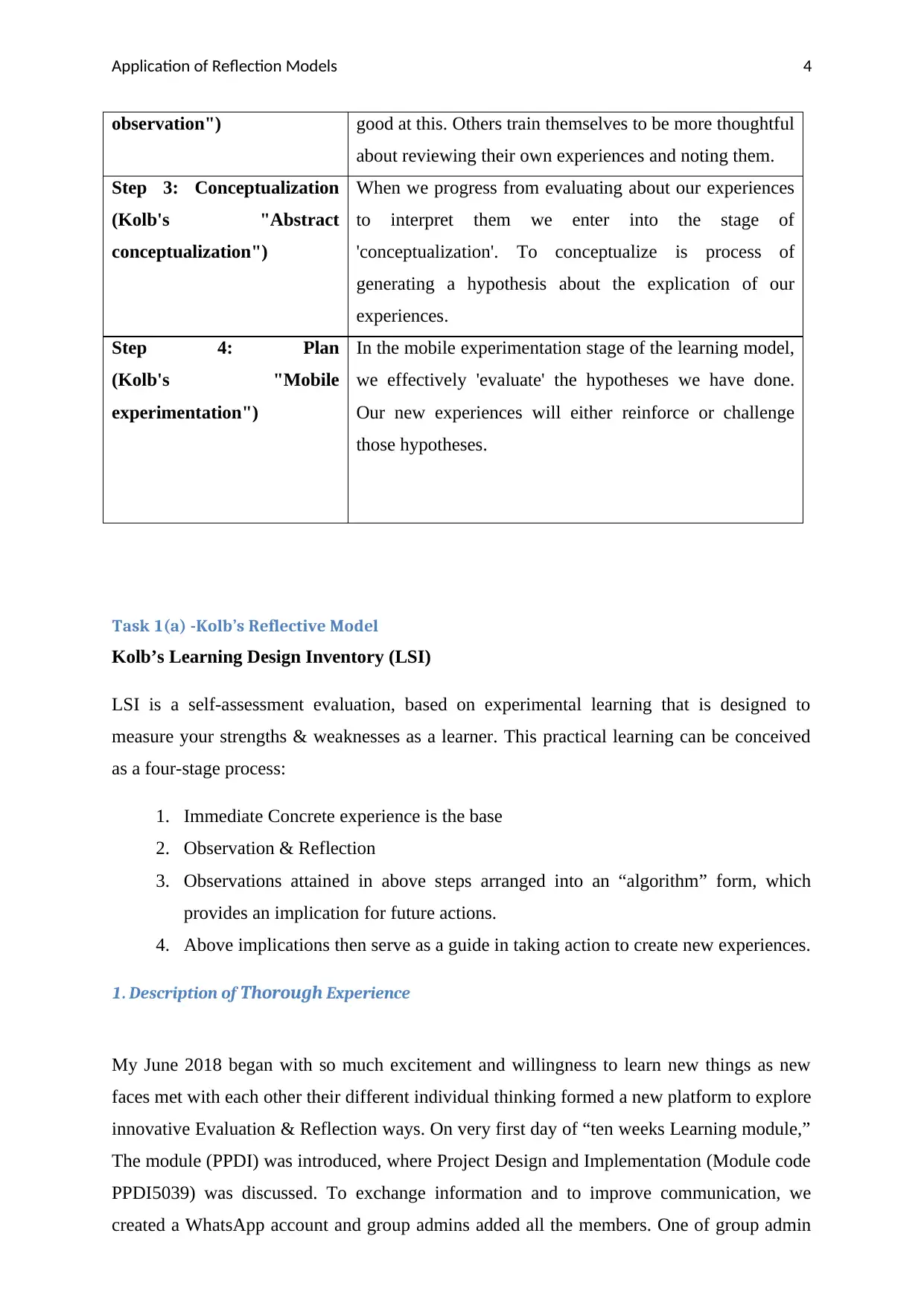
Application of Reflection Models 4
observation") good at this. Others train themselves to be more thoughtful
about reviewing their own experiences and noting them.
Step 3: Conceptualization
(Kolb's "Abstract
conceptualization")
When we progress from evaluating about our experiences
to interpret them we enter into the stage of
'conceptualization'. To conceptualize is process of
generating a hypothesis about the explication of our
experiences.
Step 4: Plan
(Kolb's "Mobile
experimentation")
In the mobile experimentation stage of the learning model,
we effectively 'evaluate' the hypotheses we have done.
Our new experiences will either reinforce or challenge
those hypotheses.
Task 1(a) -Kolb’s Reflective Model
Kolb’s Learning Design Inventory (LSI)
LSI is a self-assessment evaluation, based on experimental learning that is designed to
measure your strengths & weaknesses as a learner. This practical learning can be conceived
as a four-stage process:
1. Immediate Concrete experience is the base
2. Observation & Reflection
3. Observations attained in above steps arranged into an “algorithm” form, which
provides an implication for future actions.
4. Above implications then serve as a guide in taking action to create new experiences.
1. Description of Thorough Experience
My June 2018 began with so much excitement and willingness to learn new things as new
faces met with each other their different individual thinking formed a new platform to explore
innovative Evaluation & Reflection ways. On very first day of “ten weeks Learning module,”
The module (PPDI) was introduced, where Project Design and Implementation (Module code
PPDI5039) was discussed. To exchange information and to improve communication, we
created a WhatsApp account and group admins added all the members. One of group admin
observation") good at this. Others train themselves to be more thoughtful
about reviewing their own experiences and noting them.
Step 3: Conceptualization
(Kolb's "Abstract
conceptualization")
When we progress from evaluating about our experiences
to interpret them we enter into the stage of
'conceptualization'. To conceptualize is process of
generating a hypothesis about the explication of our
experiences.
Step 4: Plan
(Kolb's "Mobile
experimentation")
In the mobile experimentation stage of the learning model,
we effectively 'evaluate' the hypotheses we have done.
Our new experiences will either reinforce or challenge
those hypotheses.
Task 1(a) -Kolb’s Reflective Model
Kolb’s Learning Design Inventory (LSI)
LSI is a self-assessment evaluation, based on experimental learning that is designed to
measure your strengths & weaknesses as a learner. This practical learning can be conceived
as a four-stage process:
1. Immediate Concrete experience is the base
2. Observation & Reflection
3. Observations attained in above steps arranged into an “algorithm” form, which
provides an implication for future actions.
4. Above implications then serve as a guide in taking action to create new experiences.
1. Description of Thorough Experience
My June 2018 began with so much excitement and willingness to learn new things as new
faces met with each other their different individual thinking formed a new platform to explore
innovative Evaluation & Reflection ways. On very first day of “ten weeks Learning module,”
The module (PPDI) was introduced, where Project Design and Implementation (Module code
PPDI5039) was discussed. To exchange information and to improve communication, we
created a WhatsApp account and group admins added all the members. One of group admin
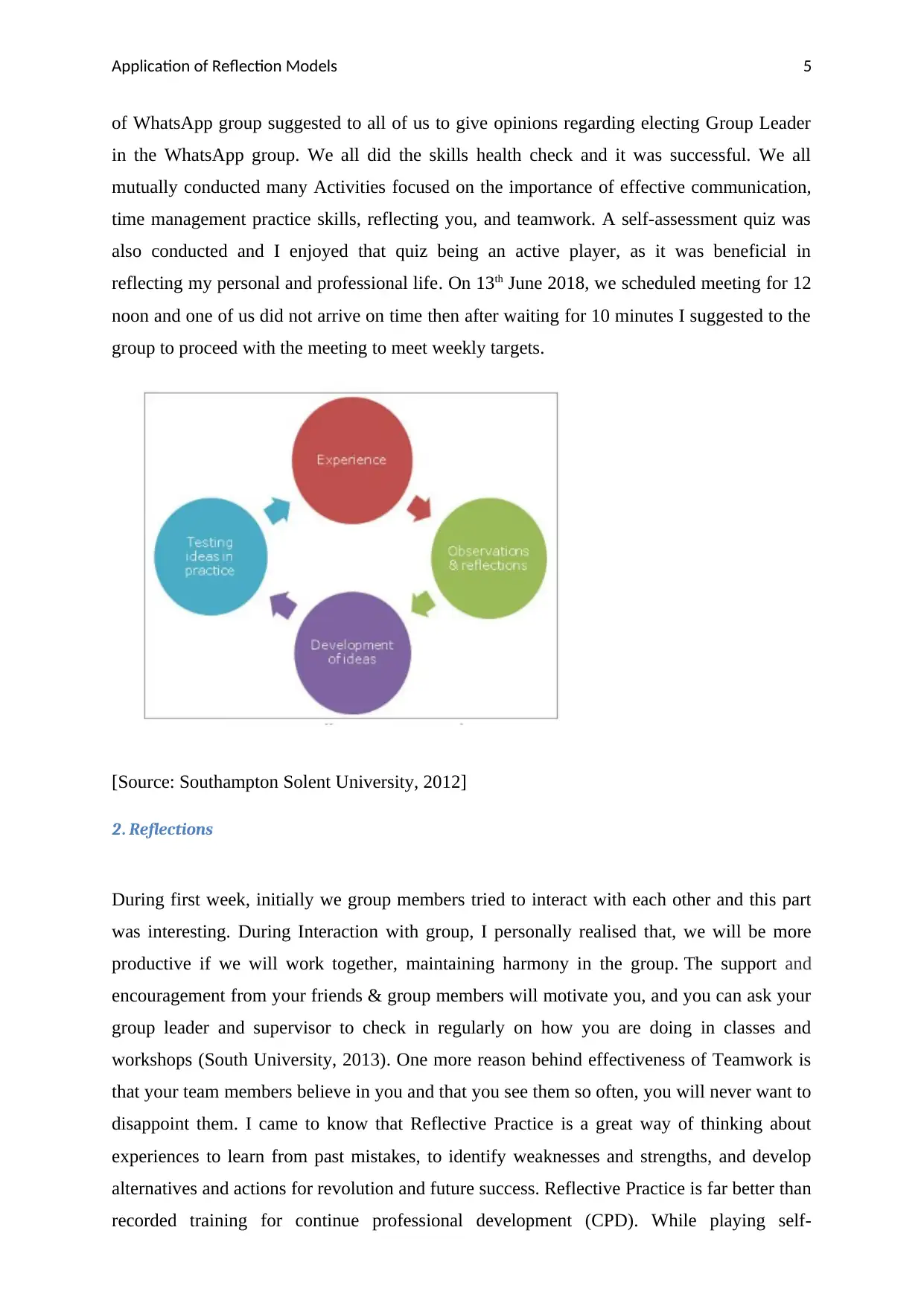
Application of Reflection Models 5
of WhatsApp group suggested to all of us to give opinions regarding electing Group Leader
in the WhatsApp group. We all did the skills health check and it was successful. We all
mutually conducted many Activities focused on the importance of effective communication,
time management practice skills, reflecting you, and teamwork. A self-assessment quiz was
also conducted and I enjoyed that quiz being an active player, as it was beneficial in
reflecting my personal and professional life. On 13th June 2018, we scheduled meeting for 12
noon and one of us did not arrive on time then after waiting for 10 minutes I suggested to the
group to proceed with the meeting to meet weekly targets.
[Source: Southampton Solent University, 2012]
2. Reflections
During first week, initially we group members tried to interact with each other and this part
was interesting. During Interaction with group, I personally realised that, we will be more
productive if we will work together, maintaining harmony in the group. The support and
encouragement from your friends & group members will motivate you, and you can ask your
group leader and supervisor to check in regularly on how you are doing in classes and
workshops (South University, 2013). One more reason behind effectiveness of Teamwork is
that your team members believe in you and that you see them so often, you will never want to
disappoint them. I came to know that Reflective Practice is a great way of thinking about
experiences to learn from past mistakes, to identify weaknesses and strengths, and develop
alternatives and actions for revolution and future success. Reflective Practice is far better than
recorded training for continue professional development (CPD). While playing self-
of WhatsApp group suggested to all of us to give opinions regarding electing Group Leader
in the WhatsApp group. We all did the skills health check and it was successful. We all
mutually conducted many Activities focused on the importance of effective communication,
time management practice skills, reflecting you, and teamwork. A self-assessment quiz was
also conducted and I enjoyed that quiz being an active player, as it was beneficial in
reflecting my personal and professional life. On 13th June 2018, we scheduled meeting for 12
noon and one of us did not arrive on time then after waiting for 10 minutes I suggested to the
group to proceed with the meeting to meet weekly targets.
[Source: Southampton Solent University, 2012]
2. Reflections
During first week, initially we group members tried to interact with each other and this part
was interesting. During Interaction with group, I personally realised that, we will be more
productive if we will work together, maintaining harmony in the group. The support and
encouragement from your friends & group members will motivate you, and you can ask your
group leader and supervisor to check in regularly on how you are doing in classes and
workshops (South University, 2013). One more reason behind effectiveness of Teamwork is
that your team members believe in you and that you see them so often, you will never want to
disappoint them. I came to know that Reflective Practice is a great way of thinking about
experiences to learn from past mistakes, to identify weaknesses and strengths, and develop
alternatives and actions for revolution and future success. Reflective Practice is far better than
recorded training for continue professional development (CPD). While playing self-
⊘ This is a preview!⊘
Do you want full access?
Subscribe today to unlock all pages.

Trusted by 1+ million students worldwide
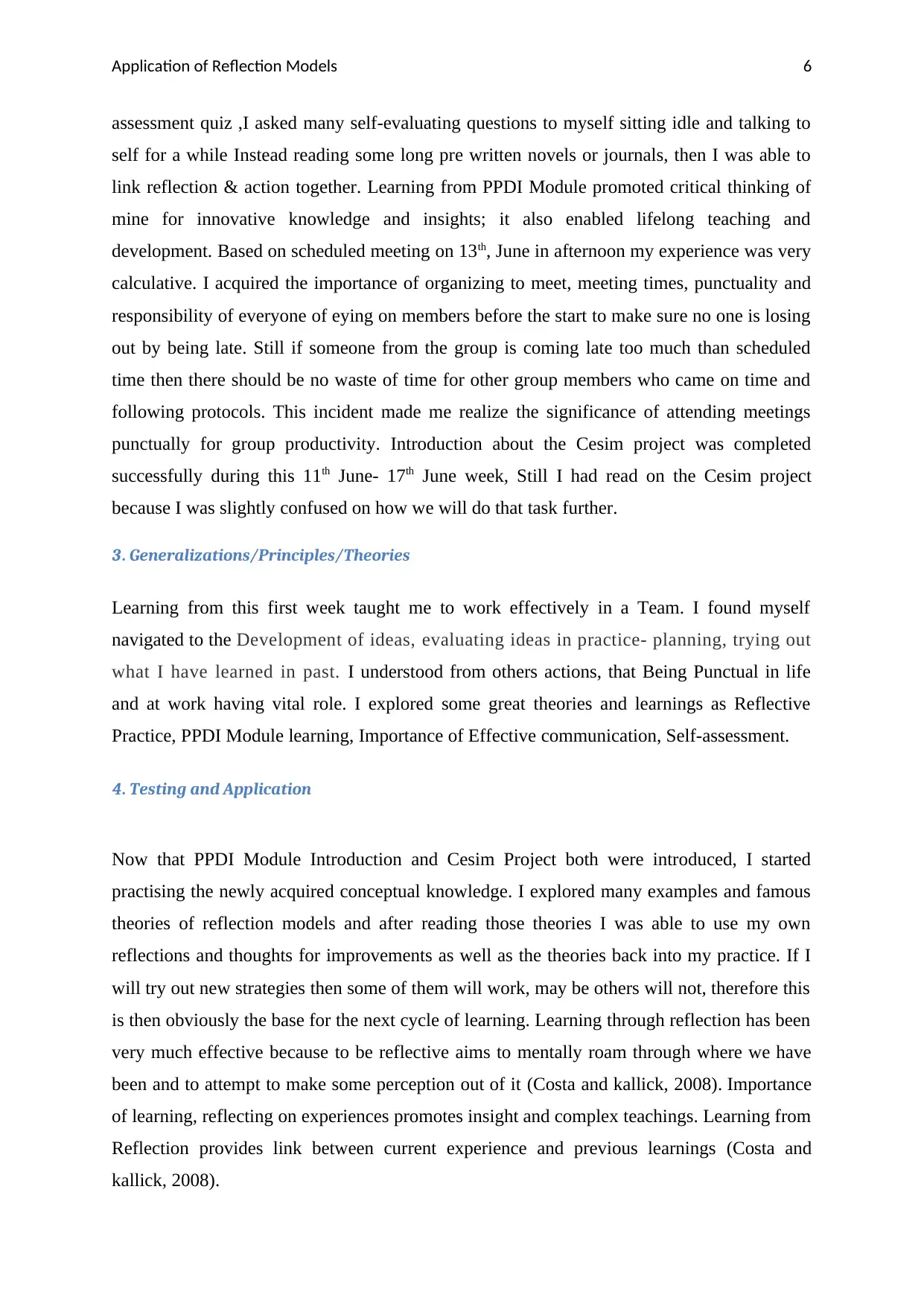
Application of Reflection Models 6
assessment quiz ,I asked many self-evaluating questions to myself sitting idle and talking to
self for a while Instead reading some long pre written novels or journals, then I was able to
link reflection & action together. Learning from PPDI Module promoted critical thinking of
mine for innovative knowledge and insights; it also enabled lifelong teaching and
development. Based on scheduled meeting on 13th, June in afternoon my experience was very
calculative. I acquired the importance of organizing to meet, meeting times, punctuality and
responsibility of everyone of eying on members before the start to make sure no one is losing
out by being late. Still if someone from the group is coming late too much than scheduled
time then there should be no waste of time for other group members who came on time and
following protocols. This incident made me realize the significance of attending meetings
punctually for group productivity. Introduction about the Cesim project was completed
successfully during this 11th June- 17th June week, Still I had read on the Cesim project
because I was slightly confused on how we will do that task further.
3. Generalizations/Principles/Theories
Learning from this first week taught me to work effectively in a Team. I found myself
navigated to the Development of ideas, evaluating ideas in practice- planning, trying out
what I have learned in past. I understood from others actions, that Being Punctual in life
and at work having vital role. I explored some great theories and learnings as Reflective
Practice, PPDI Module learning, Importance of Effective communication, Self-assessment.
4. Testing and Application
Now that PPDI Module Introduction and Cesim Project both were introduced, I started
practising the newly acquired conceptual knowledge. I explored many examples and famous
theories of reflection models and after reading those theories I was able to use my own
reflections and thoughts for improvements as well as the theories back into my practice. If I
will try out new strategies then some of them will work, may be others will not, therefore this
is then obviously the base for the next cycle of learning. Learning through reflection has been
very much effective because to be reflective aims to mentally roam through where we have
been and to attempt to make some perception out of it (Costa and kallick, 2008). Importance
of learning, reflecting on experiences promotes insight and complex teachings. Learning from
Reflection provides link between current experience and previous learnings (Costa and
kallick, 2008).
assessment quiz ,I asked many self-evaluating questions to myself sitting idle and talking to
self for a while Instead reading some long pre written novels or journals, then I was able to
link reflection & action together. Learning from PPDI Module promoted critical thinking of
mine for innovative knowledge and insights; it also enabled lifelong teaching and
development. Based on scheduled meeting on 13th, June in afternoon my experience was very
calculative. I acquired the importance of organizing to meet, meeting times, punctuality and
responsibility of everyone of eying on members before the start to make sure no one is losing
out by being late. Still if someone from the group is coming late too much than scheduled
time then there should be no waste of time for other group members who came on time and
following protocols. This incident made me realize the significance of attending meetings
punctually for group productivity. Introduction about the Cesim project was completed
successfully during this 11th June- 17th June week, Still I had read on the Cesim project
because I was slightly confused on how we will do that task further.
3. Generalizations/Principles/Theories
Learning from this first week taught me to work effectively in a Team. I found myself
navigated to the Development of ideas, evaluating ideas in practice- planning, trying out
what I have learned in past. I understood from others actions, that Being Punctual in life
and at work having vital role. I explored some great theories and learnings as Reflective
Practice, PPDI Module learning, Importance of Effective communication, Self-assessment.
4. Testing and Application
Now that PPDI Module Introduction and Cesim Project both were introduced, I started
practising the newly acquired conceptual knowledge. I explored many examples and famous
theories of reflection models and after reading those theories I was able to use my own
reflections and thoughts for improvements as well as the theories back into my practice. If I
will try out new strategies then some of them will work, may be others will not, therefore this
is then obviously the base for the next cycle of learning. Learning through reflection has been
very much effective because to be reflective aims to mentally roam through where we have
been and to attempt to make some perception out of it (Costa and kallick, 2008). Importance
of learning, reflecting on experiences promotes insight and complex teachings. Learning from
Reflection provides link between current experience and previous learnings (Costa and
kallick, 2008).
Paraphrase This Document
Need a fresh take? Get an instant paraphrase of this document with our AI Paraphraser
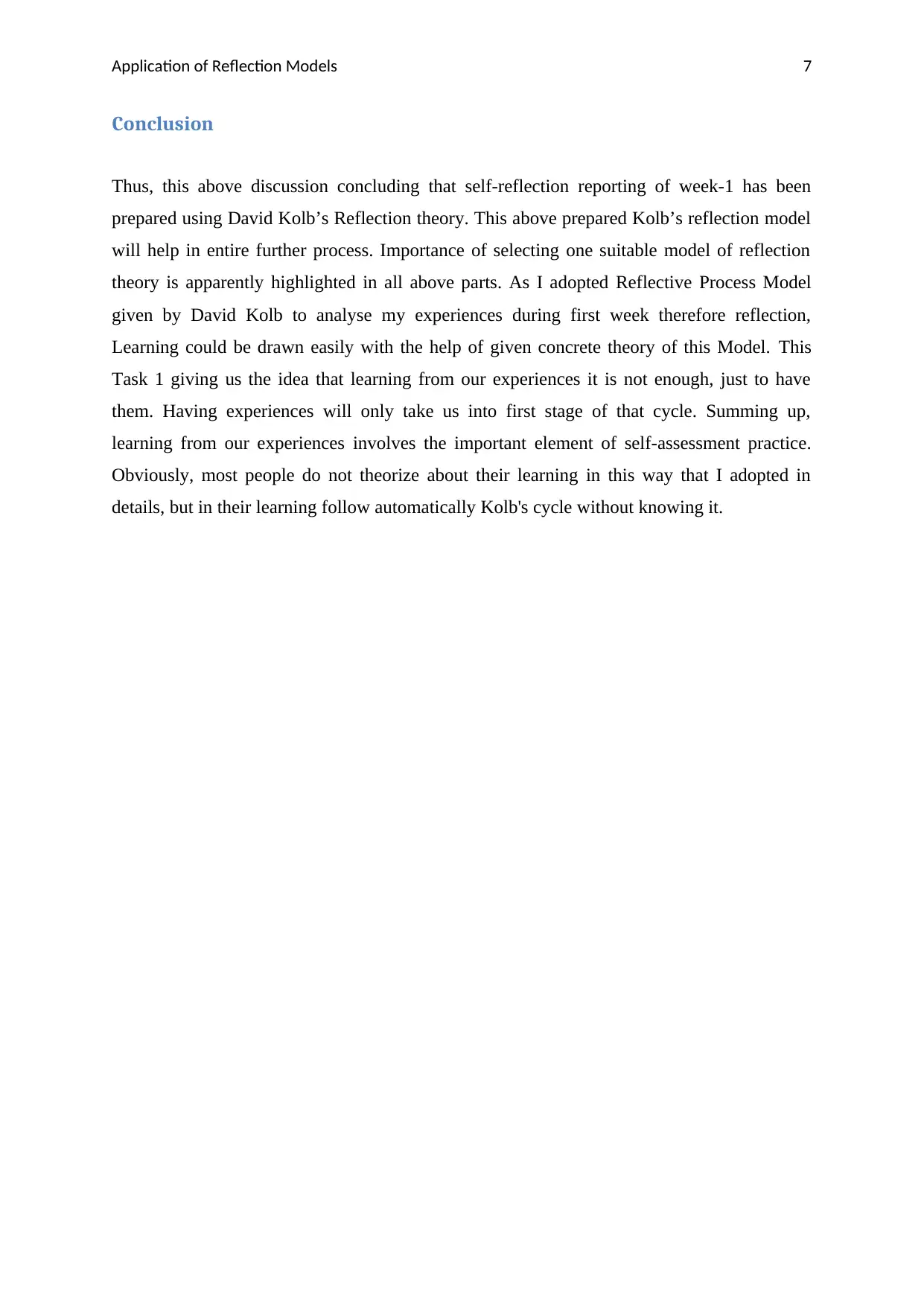
Application of Reflection Models 7
Conclusion
Thus, this above discussion concluding that self-reflection reporting of week-1 has been
prepared using David Kolb’s Reflection theory. This above prepared Kolb’s reflection model
will help in entire further process. Importance of selecting one suitable model of reflection
theory is apparently highlighted in all above parts. As I adopted Reflective Process Model
given by David Kolb to analyse my experiences during first week therefore reflection,
Learning could be drawn easily with the help of given concrete theory of this Model. This
Task 1 giving us the idea that learning from our experiences it is not enough, just to have
them. Having experiences will only take us into first stage of that cycle. Summing up,
learning from our experiences involves the important element of self-assessment practice.
Obviously, most people do not theorize about their learning in this way that I adopted in
details, but in their learning follow automatically Kolb's cycle without knowing it.
Conclusion
Thus, this above discussion concluding that self-reflection reporting of week-1 has been
prepared using David Kolb’s Reflection theory. This above prepared Kolb’s reflection model
will help in entire further process. Importance of selecting one suitable model of reflection
theory is apparently highlighted in all above parts. As I adopted Reflective Process Model
given by David Kolb to analyse my experiences during first week therefore reflection,
Learning could be drawn easily with the help of given concrete theory of this Model. This
Task 1 giving us the idea that learning from our experiences it is not enough, just to have
them. Having experiences will only take us into first stage of that cycle. Summing up,
learning from our experiences involves the important element of self-assessment practice.
Obviously, most people do not theorize about their learning in this way that I adopted in
details, but in their learning follow automatically Kolb's cycle without knowing it.
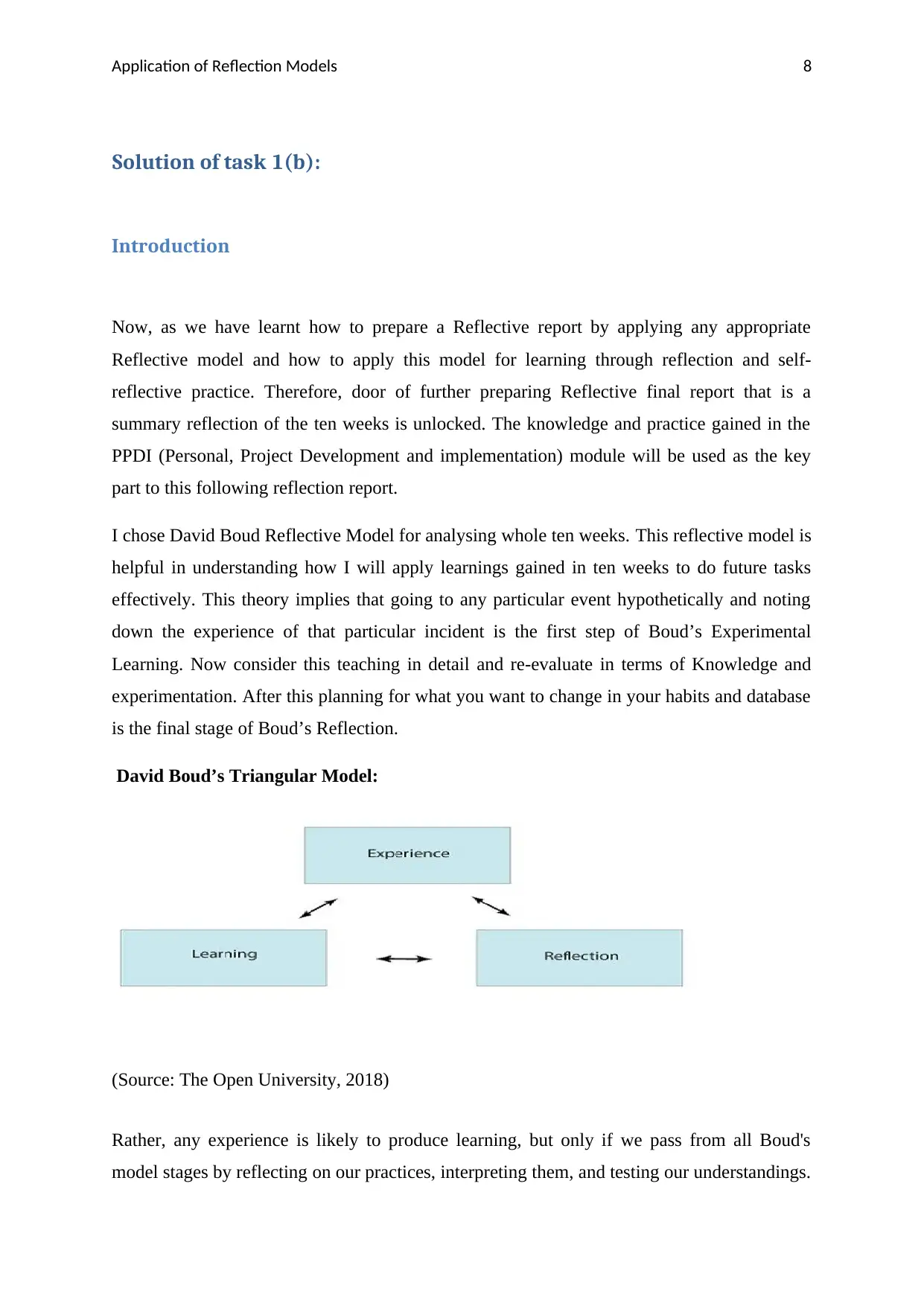
Application of Reflection Models 8
Solution of task 1(b):
Introduction
Now, as we have learnt how to prepare a Reflective report by applying any appropriate
Reflective model and how to apply this model for learning through reflection and self-
reflective practice. Therefore, door of further preparing Reflective final report that is a
summary reflection of the ten weeks is unlocked. The knowledge and practice gained in the
PPDI (Personal, Project Development and implementation) module will be used as the key
part to this following reflection report.
I chose David Boud Reflective Model for analysing whole ten weeks. This reflective model is
helpful in understanding how I will apply learnings gained in ten weeks to do future tasks
effectively. This theory implies that going to any particular event hypothetically and noting
down the experience of that particular incident is the first step of Boud’s Experimental
Learning. Now consider this teaching in detail and re-evaluate in terms of Knowledge and
experimentation. After this planning for what you want to change in your habits and database
is the final stage of Boud’s Reflection.
David Boud’s Triangular Model:
(Source: The Open University, 2018)
Rather, any experience is likely to produce learning, but only if we pass from all Boud's
model stages by reflecting on our practices, interpreting them, and testing our understandings.
Solution of task 1(b):
Introduction
Now, as we have learnt how to prepare a Reflective report by applying any appropriate
Reflective model and how to apply this model for learning through reflection and self-
reflective practice. Therefore, door of further preparing Reflective final report that is a
summary reflection of the ten weeks is unlocked. The knowledge and practice gained in the
PPDI (Personal, Project Development and implementation) module will be used as the key
part to this following reflection report.
I chose David Boud Reflective Model for analysing whole ten weeks. This reflective model is
helpful in understanding how I will apply learnings gained in ten weeks to do future tasks
effectively. This theory implies that going to any particular event hypothetically and noting
down the experience of that particular incident is the first step of Boud’s Experimental
Learning. Now consider this teaching in detail and re-evaluate in terms of Knowledge and
experimentation. After this planning for what you want to change in your habits and database
is the final stage of Boud’s Reflection.
David Boud’s Triangular Model:
(Source: The Open University, 2018)
Rather, any experience is likely to produce learning, but only if we pass from all Boud's
model stages by reflecting on our practices, interpreting them, and testing our understandings.
⊘ This is a preview!⊘
Do you want full access?
Subscribe today to unlock all pages.

Trusted by 1+ million students worldwide
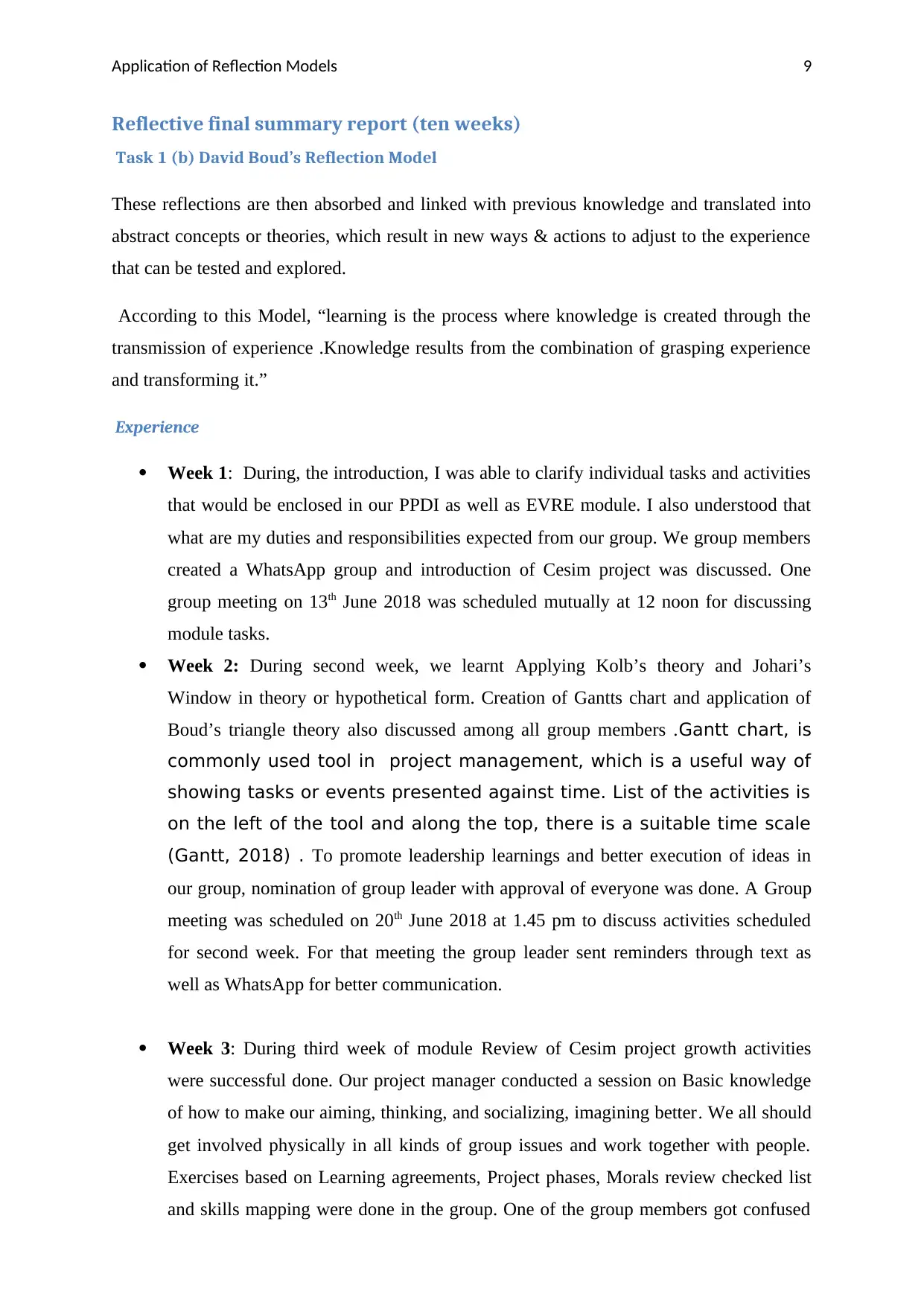
Application of Reflection Models 9
Reflective final summary report (ten weeks)
Task 1 (b) David Boud’s Reflection Model
These reflections are then absorbed and linked with previous knowledge and translated into
abstract concepts or theories, which result in new ways & actions to adjust to the experience
that can be tested and explored.
According to this Model, “learning is the process where knowledge is created through the
transmission of experience .Knowledge results from the combination of grasping experience
and transforming it.”
Experience
Week 1: During, the introduction, I was able to clarify individual tasks and activities
that would be enclosed in our PPDI as well as EVRE module. I also understood that
what are my duties and responsibilities expected from our group. We group members
created a WhatsApp group and introduction of Cesim project was discussed. One
group meeting on 13th June 2018 was scheduled mutually at 12 noon for discussing
module tasks.
Week 2: During second week, we learnt Applying Kolb’s theory and Johari’s
Window in theory or hypothetical form. Creation of Gantts chart and application of
Boud’s triangle theory also discussed among all group members .Gantt chart, is
commonly used tool in project management, which is a useful way of
showing tasks or events presented against time. List of the activities is
on the left of the tool and along the top, there is a suitable time scale
(Gantt, 2018) . To promote leadership learnings and better execution of ideas in
our group, nomination of group leader with approval of everyone was done. A Group
meeting was scheduled on 20th June 2018 at 1.45 pm to discuss activities scheduled
for second week. For that meeting the group leader sent reminders through text as
well as WhatsApp for better communication.
Week 3: During third week of module Review of Cesim project growth activities
were successful done. Our project manager conducted a session on Basic knowledge
of how to make our aiming, thinking, and socializing, imagining better. We all should
get involved physically in all kinds of group issues and work together with people.
Exercises based on Learning agreements, Project phases, Morals review checked list
and skills mapping were done in the group. One of the group members got confused
Reflective final summary report (ten weeks)
Task 1 (b) David Boud’s Reflection Model
These reflections are then absorbed and linked with previous knowledge and translated into
abstract concepts or theories, which result in new ways & actions to adjust to the experience
that can be tested and explored.
According to this Model, “learning is the process where knowledge is created through the
transmission of experience .Knowledge results from the combination of grasping experience
and transforming it.”
Experience
Week 1: During, the introduction, I was able to clarify individual tasks and activities
that would be enclosed in our PPDI as well as EVRE module. I also understood that
what are my duties and responsibilities expected from our group. We group members
created a WhatsApp group and introduction of Cesim project was discussed. One
group meeting on 13th June 2018 was scheduled mutually at 12 noon for discussing
module tasks.
Week 2: During second week, we learnt Applying Kolb’s theory and Johari’s
Window in theory or hypothetical form. Creation of Gantts chart and application of
Boud’s triangle theory also discussed among all group members .Gantt chart, is
commonly used tool in project management, which is a useful way of
showing tasks or events presented against time. List of the activities is
on the left of the tool and along the top, there is a suitable time scale
(Gantt, 2018) . To promote leadership learnings and better execution of ideas in
our group, nomination of group leader with approval of everyone was done. A Group
meeting was scheduled on 20th June 2018 at 1.45 pm to discuss activities scheduled
for second week. For that meeting the group leader sent reminders through text as
well as WhatsApp for better communication.
Week 3: During third week of module Review of Cesim project growth activities
were successful done. Our project manager conducted a session on Basic knowledge
of how to make our aiming, thinking, and socializing, imagining better. We all should
get involved physically in all kinds of group issues and work together with people.
Exercises based on Learning agreements, Project phases, Morals review checked list
and skills mapping were done in the group. One of the group members got confused
Paraphrase This Document
Need a fresh take? Get an instant paraphrase of this document with our AI Paraphraser
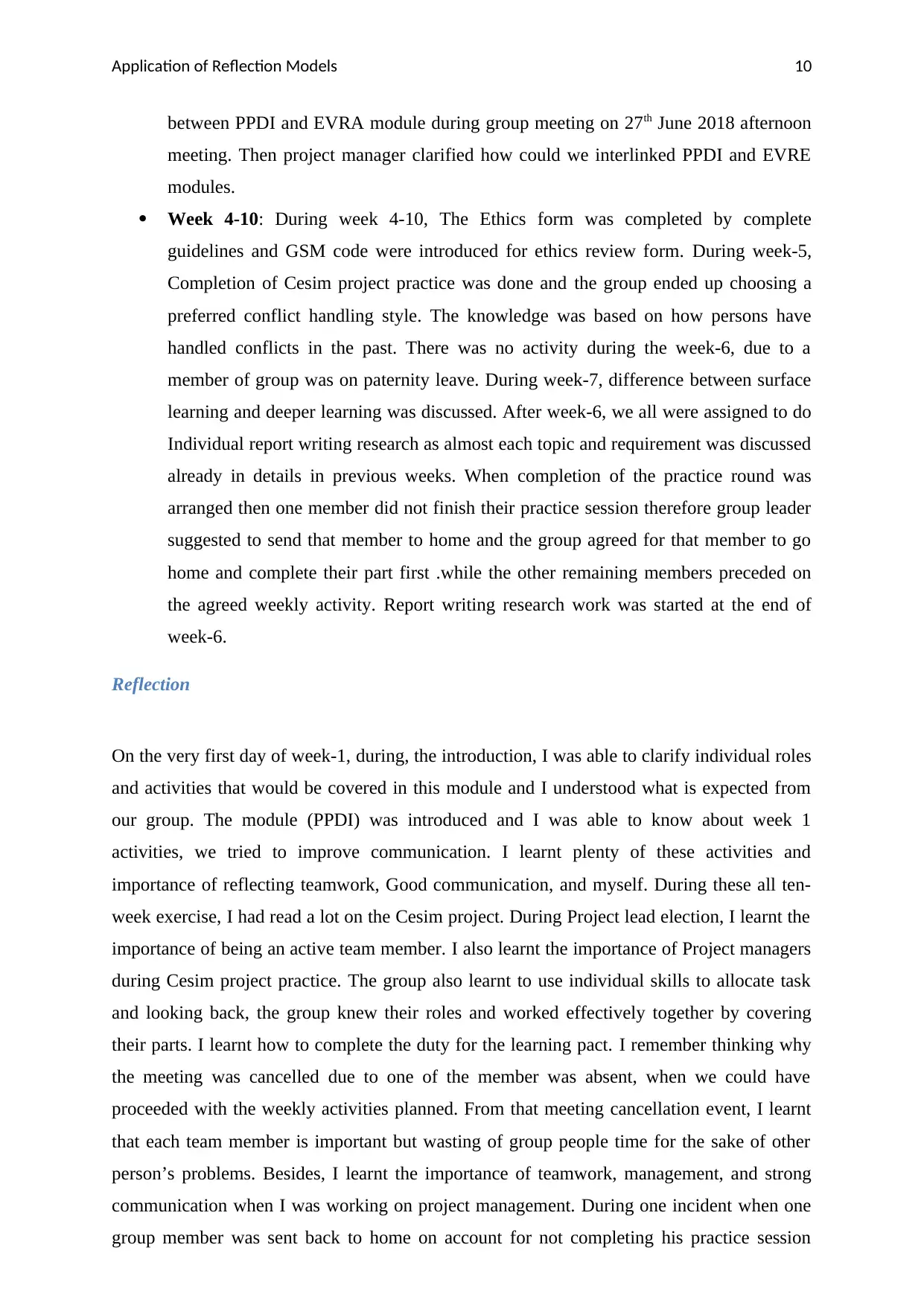
Application of Reflection Models 10
between PPDI and EVRA module during group meeting on 27th June 2018 afternoon
meeting. Then project manager clarified how could we interlinked PPDI and EVRE
modules.
Week 4-10: During week 4-10, The Ethics form was completed by complete
guidelines and GSM code were introduced for ethics review form. During week-5,
Completion of Cesim project practice was done and the group ended up choosing a
preferred conflict handling style. The knowledge was based on how persons have
handled conflicts in the past. There was no activity during the week-6, due to a
member of group was on paternity leave. During week-7, difference between surface
learning and deeper learning was discussed. After week-6, we all were assigned to do
Individual report writing research as almost each topic and requirement was discussed
already in details in previous weeks. When completion of the practice round was
arranged then one member did not finish their practice session therefore group leader
suggested to send that member to home and the group agreed for that member to go
home and complete their part first .while the other remaining members preceded on
the agreed weekly activity. Report writing research work was started at the end of
week-6.
Reflection
On the very first day of week-1, during, the introduction, I was able to clarify individual roles
and activities that would be covered in this module and I understood what is expected from
our group. The module (PPDI) was introduced and I was able to know about week 1
activities, we tried to improve communication. I learnt plenty of these activities and
importance of reflecting teamwork, Good communication, and myself. During these all ten-
week exercise, I had read a lot on the Cesim project. During Project lead election, I learnt the
importance of being an active team member. I also learnt the importance of Project managers
during Cesim project practice. The group also learnt to use individual skills to allocate task
and looking back, the group knew their roles and worked effectively together by covering
their parts. I learnt how to complete the duty for the learning pact. I remember thinking why
the meeting was cancelled due to one of the member was absent, when we could have
proceeded with the weekly activities planned. From that meeting cancellation event, I learnt
that each team member is important but wasting of group people time for the sake of other
person’s problems. Besides, I learnt the importance of teamwork, management, and strong
communication when I was working on project management. During one incident when one
group member was sent back to home on account for not completing his practice session
between PPDI and EVRA module during group meeting on 27th June 2018 afternoon
meeting. Then project manager clarified how could we interlinked PPDI and EVRE
modules.
Week 4-10: During week 4-10, The Ethics form was completed by complete
guidelines and GSM code were introduced for ethics review form. During week-5,
Completion of Cesim project practice was done and the group ended up choosing a
preferred conflict handling style. The knowledge was based on how persons have
handled conflicts in the past. There was no activity during the week-6, due to a
member of group was on paternity leave. During week-7, difference between surface
learning and deeper learning was discussed. After week-6, we all were assigned to do
Individual report writing research as almost each topic and requirement was discussed
already in details in previous weeks. When completion of the practice round was
arranged then one member did not finish their practice session therefore group leader
suggested to send that member to home and the group agreed for that member to go
home and complete their part first .while the other remaining members preceded on
the agreed weekly activity. Report writing research work was started at the end of
week-6.
Reflection
On the very first day of week-1, during, the introduction, I was able to clarify individual roles
and activities that would be covered in this module and I understood what is expected from
our group. The module (PPDI) was introduced and I was able to know about week 1
activities, we tried to improve communication. I learnt plenty of these activities and
importance of reflecting teamwork, Good communication, and myself. During these all ten-
week exercise, I had read a lot on the Cesim project. During Project lead election, I learnt the
importance of being an active team member. I also learnt the importance of Project managers
during Cesim project practice. The group also learnt to use individual skills to allocate task
and looking back, the group knew their roles and worked effectively together by covering
their parts. I learnt how to complete the duty for the learning pact. I remember thinking why
the meeting was cancelled due to one of the member was absent, when we could have
proceeded with the weekly activities planned. From that meeting cancellation event, I learnt
that each team member is important but wasting of group people time for the sake of other
person’s problems. Besides, I learnt the importance of teamwork, management, and strong
communication when I was working on project management. During one incident when one
group member was sent back to home on account for not completing his practice session
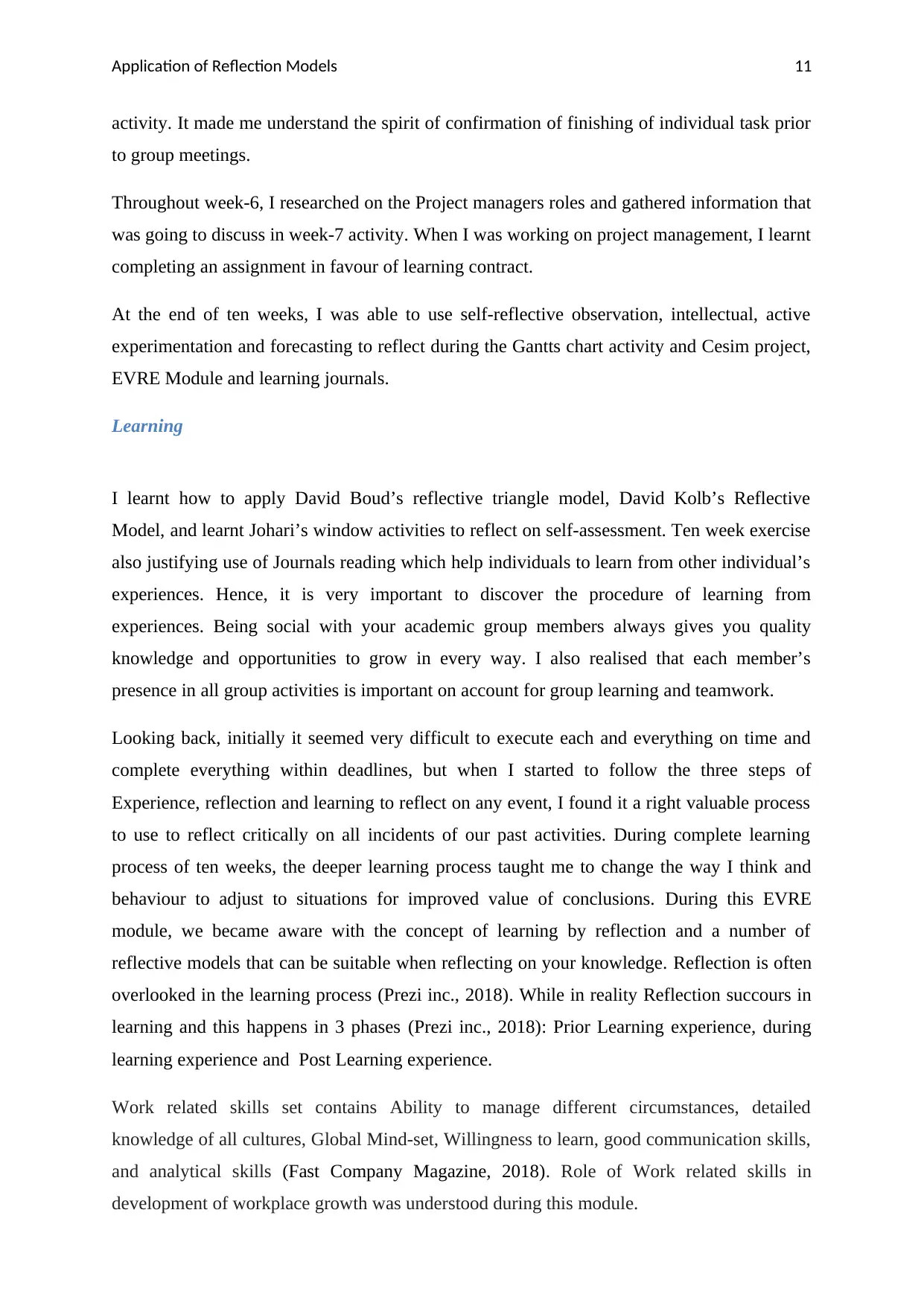
Application of Reflection Models 11
activity. It made me understand the spirit of confirmation of finishing of individual task prior
to group meetings.
Throughout week-6, I researched on the Project managers roles and gathered information that
was going to discuss in week-7 activity. When I was working on project management, I learnt
completing an assignment in favour of learning contract.
At the end of ten weeks, I was able to use self-reflective observation, intellectual, active
experimentation and forecasting to reflect during the Gantts chart activity and Cesim project,
EVRE Module and learning journals.
Learning
I learnt how to apply David Boud’s reflective triangle model, David Kolb’s Reflective
Model, and learnt Johari’s window activities to reflect on self-assessment. Ten week exercise
also justifying use of Journals reading which help individuals to learn from other individual’s
experiences. Hence, it is very important to discover the procedure of learning from
experiences. Being social with your academic group members always gives you quality
knowledge and opportunities to grow in every way. I also realised that each member’s
presence in all group activities is important on account for group learning and teamwork.
Looking back, initially it seemed very difficult to execute each and everything on time and
complete everything within deadlines, but when I started to follow the three steps of
Experience, reflection and learning to reflect on any event, I found it a right valuable process
to use to reflect critically on all incidents of our past activities. During complete learning
process of ten weeks, the deeper learning process taught me to change the way I think and
behaviour to adjust to situations for improved value of conclusions. During this EVRE
module, we became aware with the concept of learning by reflection and a number of
reflective models that can be suitable when reflecting on your knowledge. Reflection is often
overlooked in the learning process (Prezi inc., 2018). While in reality Reflection succours in
learning and this happens in 3 phases (Prezi inc., 2018): Prior Learning experience, during
learning experience and Post Learning experience.
Work related skills set contains Ability to manage different circumstances, detailed
knowledge of all cultures, Global Mind-set, Willingness to learn, good communication skills,
and analytical skills (Fast Company Magazine, 2018). Role of Work related skills in
development of workplace growth was understood during this module.
activity. It made me understand the spirit of confirmation of finishing of individual task prior
to group meetings.
Throughout week-6, I researched on the Project managers roles and gathered information that
was going to discuss in week-7 activity. When I was working on project management, I learnt
completing an assignment in favour of learning contract.
At the end of ten weeks, I was able to use self-reflective observation, intellectual, active
experimentation and forecasting to reflect during the Gantts chart activity and Cesim project,
EVRE Module and learning journals.
Learning
I learnt how to apply David Boud’s reflective triangle model, David Kolb’s Reflective
Model, and learnt Johari’s window activities to reflect on self-assessment. Ten week exercise
also justifying use of Journals reading which help individuals to learn from other individual’s
experiences. Hence, it is very important to discover the procedure of learning from
experiences. Being social with your academic group members always gives you quality
knowledge and opportunities to grow in every way. I also realised that each member’s
presence in all group activities is important on account for group learning and teamwork.
Looking back, initially it seemed very difficult to execute each and everything on time and
complete everything within deadlines, but when I started to follow the three steps of
Experience, reflection and learning to reflect on any event, I found it a right valuable process
to use to reflect critically on all incidents of our past activities. During complete learning
process of ten weeks, the deeper learning process taught me to change the way I think and
behaviour to adjust to situations for improved value of conclusions. During this EVRE
module, we became aware with the concept of learning by reflection and a number of
reflective models that can be suitable when reflecting on your knowledge. Reflection is often
overlooked in the learning process (Prezi inc., 2018). While in reality Reflection succours in
learning and this happens in 3 phases (Prezi inc., 2018): Prior Learning experience, during
learning experience and Post Learning experience.
Work related skills set contains Ability to manage different circumstances, detailed
knowledge of all cultures, Global Mind-set, Willingness to learn, good communication skills,
and analytical skills (Fast Company Magazine, 2018). Role of Work related skills in
development of workplace growth was understood during this module.
⊘ This is a preview!⊘
Do you want full access?
Subscribe today to unlock all pages.

Trusted by 1+ million students worldwide
1 out of 20
Related Documents
Your All-in-One AI-Powered Toolkit for Academic Success.
+13062052269
info@desklib.com
Available 24*7 on WhatsApp / Email
![[object Object]](/_next/static/media/star-bottom.7253800d.svg)
Unlock your academic potential
Copyright © 2020–2026 A2Z Services. All Rights Reserved. Developed and managed by ZUCOL.





